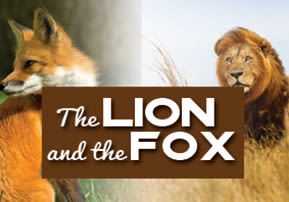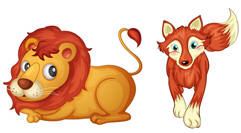
The Lion and the Fox
Once the lion's lust for flesh got the best of him, he lost the power of judgment that made him king of the animals; only then, could the fox outsmart him...

Rabbi Yosef Chaim of Baghdad, the famed “Ben Ish Chai” of blessed and saintly memory, was a phenomenal storyteller. One of his best is the following parable about the lion and the fox, which we’ll retell with our own embellishment:
A hungry lion was hunting in the forest. Poised behind a tree, he saw a nonchalant red fox meandering along a narrow path, enjoying the springtime afternoon sunshine and breeze. The lion pounced on the fox and was about to devour it…
“Hold on, Mr. Lion,” exclaimed the fox, “I’m about to be the most disappointing meal you ever had. I weigh a mere 15 pounds soaking wet, and if you deduct my fur and bones, you’re barely left with 3 pounds of  skinny, gristly meat. That’s barely a meal for a 400-pound lion.”
skinny, gristly meat. That’s barely a meal for a 400-pound lion.”
The fox could see that he scored a point, for the lion was hesitating. Continuing to ride his wave of persuasive prowess, the crafty fox redirected the lion’s attention to the edge of the forest. “Look at that park that borders on the edge of the forest,” the fox said, pointing a hundred yards ahead. “Look at that fat man sitting on the bench. Not only is he easy prey for you, but he weighs at least 220 pounds; now there’s a juicy meal for a lion!”
The lion shook his mane in the negative: “According to the Animal Code of Law, we’re allowed to devour one another but we’re not allowed to eat humans. Any lion who eats a human is punished for three generations.”
“Don’t be a sucker,” said the fox. “You’re a hungry mammal in need of nourishment. You’re not a herbivore that can suffice with cabbage and clover. You need meat, and lots of it! What do you care about your grandchildren? If you starve today, that won’t help them tomorrow.”
The lion’s saliva was already dripping down his chin. The fox had convinced him. He left the fox and started to craw stealthily toward the park bench on the edge of the forest, where the fat man sat reading the sports page of the Sunday newspaper, totally unsuspecting of the imminent danger. Meanwhile, the fox darted to safety…
Once the lion’s lust for flesh got the best of him, he forgot about the precautions that the park managers took to keep the wild animals of the forest out of the park. With a mere 50 feet left to crawl, the ground suddenly disappeared under the lion’s paws. He fell into a deep pit, whose steep walls rendered any dream of escaping as null and void.
The lion’s roars shook the entire forest. The fox left the hole where he was hiding and walked carefully to the edge of the pit. When the lion saw the fox, he roared, “Why did I fall into this pit? I didn’t do anything wrong!”
With a smirk on his face, the fox replied, “Sorry, pal! Your granddad ate a human, and now you’re paying the price. Besides, your actions show that you don’t care about your children and grandchildren either; you were about to do the same thing!”
* * *
My beloved teacher Rabbi Shalom Arush teaches in The Garden of Education that children suffer because they emulate their parents’ bad habits and character traits. Therefore, parents must correct themselves before they correct their children. If the father is a Haman, he cannot expect to raise a Mordechai. We can’t expect our children to love Torah and to have emuna if we don’t have emuna. If parents pursue bodily appetites and material amenities rather than emuna, their children and grandchildren will suffer, for they too will seek such a lifestyle that is loaded with misery and endless dissatisfaction. Therefore, parents who really care about their offspring and the welfare of subsequent generations will do their utmost to strengthen emuna. That way, they won’t suffer the pain of seeing their children and grandchildren falling into the pits of the evil inclination. A college education won’t guarantee the happiness of our offspring; personal example and teaching them emuna surely will.










Tell us what you think!
Thank you for your comment!
It will be published after approval by the Editor.